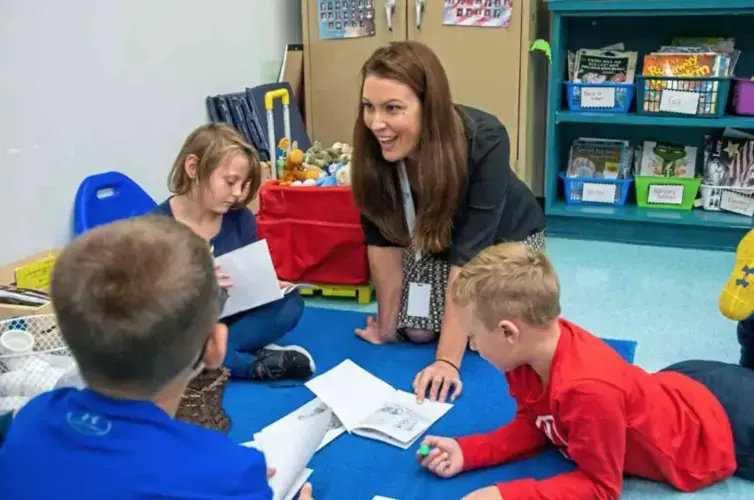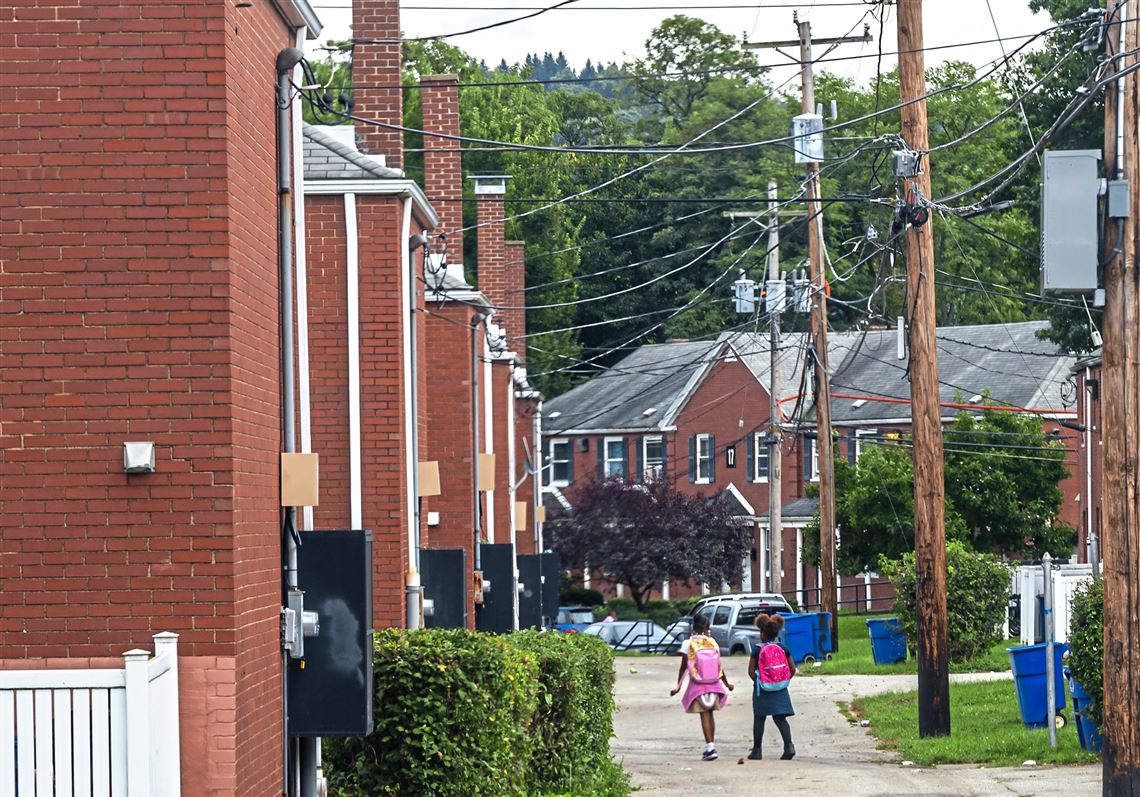
David M. Keibler wanted his dissertation to mean something more than a fancy title and degree.
The Alle-Kiski Valley community he served had crashed from stable jobs to few jobs — from widely comfortable to suddenly not. A grim uptick in poverty had created new hardships that parents, students and teachers alike were ill-equipped to handle.
As the David Leech Elementary principal saw it, his veteran staff lacked resources to contend with poverty in a region that had long thrived. He wanted them to understand the complexities of the changes they saw among students and their families.
“It would just be the constant beat-down of those kids like, ‘Why don’t you have your homework done,’” Mr. Keibler said of his staff’s frustrations. “Or ‘What’s going on?’ Or ‘You don’t care.’ ‘The parents don’t care’ or ‘They don’t come to meetings. They don’t return calls.’
“So once they understand [poverty], now we can take a different approach.”
For his dissertation — the last leg of a heavy doctoral lift that demanded late nights and time away from his wife and three daughters — Mr. Keibler chose to examine the area in which he believed the school could do the most good: child poverty, and how his teachers perceive it.
Armed with his 78-page report, he set out to equip them with the tools to give as many students as possible a chance in a messy, changing, often unforgiving world.
“You could look at the curriculum, you could look at assessments, all of those things,” he said. “But really the driving force in our community was that change, and the teachers didn’t understand what was happening and how we overcome that.”
New Struggles
Each year leading up to the holidays, guidance counselor Danielle Matus helps organize a canned-food drive to replenish a local food bank.
But in this act of charity, she sees the nuance in the challenges they face.
Of the 2,000 or so canned goods the school collects, many are from the very students the drive is intended to support.
“I’m thinking, I can’t even take this from you because this might be your dinner tonight,” Ms. Matus said.
Generosity is baked into the Leechburg-area’s DNA, she said, from before the bottom dropped out.
The borough and its neighbors have struggled since ATI Allegheny Ludlum closed its West Leechburg facility over a decade ago. The company idled its nearby Bagdad plant in 2016.
“It used to be you graduated from here, you’d walk across the bridge there, making 70, 80, up to $100,000, with your high school diploma,” Mr. Keibler said.

Today, the void is reshaping the identity of the tight-knit rural Armstrong County community, tucked along the Kiskiminetas River, about 35 miles from downtown Pittsburgh.
Naturally, the troubles hurt Leechburg’s children, more than half of whom now live below the poverty level — one of the highest rates in southwestern Pennsylvania. (Leechburg Area School District also serves West Leechburg and Gilpin.)
This year the Pittsburgh Post-Gazette’s series Growing up through the Cracks has focused on communities in which roughly half or more of children are in poverty — a condition experts view as toxic to the futures of those kids and their neighborhoods.
In Leechburg Area’s only elementary school, David Leech, over three in four students qualify for free or reduced lunch — nearly double the rate in 2010.
In his dissertation, Mr. Keibler explored how specialized training could help teachers better adapt their teaching approaches to students from disadvantaged communities. He found that his district offered no poverty-related training for teachers before last year.
He also created a snapshot of how his staff perceived the students they taught. Surveys completed by 34 teachers throughout the district — most with at least a dozen years of experience — showed further evidence that students were struggling.
Respondents reported seeing a rise in problems among students in recent years, including stress and anxiety, poor concentration, misbehavior, absenteeism and an apparent lack of educational support at home. The data validated what many of them were already seeing firsthand.
As part of the research, teachers enrolled in training by a private boarding school for poor kids. A pillar of the training held that students, in order to be successful, must be competent in at least six of the following eight benchmarks: financial; emotional; mental; physical; spiritual; support systems; role models; and knowledge of “hidden rules.”
The question was, to what extent could Mr. Keibler and his colleagues help students check those boxes while the economic landscape shifts beneath them?
Looking for Signs
On a russet Thursday morning in late October, Niva Vargo was schooling her first-graders in no fewer than five of the categories at once.
Stationed at a table of eager young readers, she walked them through an exercise plotting story maps of picture books, including titles such as “A Job For JoJo.”
“Is it fantasy or reality?” she asked them. “Fantasy is when it’s make believe.”
“Realistic fiction,” one student countered, ”because it could happen.”


In the beaming classroom at the end of the hallway, coats and backpacks were slung beneath a poster of “Oh, the Places You’ll Go!,” the Dr. Seuss classic that explores life’s ups and downs.
A native Leechburger, Mrs. Vargo went into teaching because she remembered having positive experiences in the district and wanted to ensure future generations did, too. But 15 years into her teaching career, it’s in many ways a different community than the one in which she grew up.
“I think we’re seeing poverty a lot more now than we did before,” she said. “And I don’t know if it’s because of the lack of jobs in the area, or what the actual reasoning is for it.
“But we are seeing it a lot more, which is causing there to be a big gap between some of our students. So it’s important for us to try to eliminate that gap.”
The district recently implemented full-day kindergarten, which gives first-grade teachers a better grasp on their students’ skills. Some may be reading at grade level or beyond, while others may have never been read to before, let alone know how to read themselves, she said.
Mrs. Vargo looks for signs that students might lack help at home. Indicators include unchecked folders or backpacks stuffed with papers that parents have likely never seen.
“I know it’s not going to get done at home, so I’ve got to do it here with them,” she said. “I’m not going to punish them for something that’s not their fault.”
As 6- and 7-year-olds, her most disadvantaged students are likely not yet fully aware of their circumstances. “But the older they get, the more noticeable it becomes,” she said.
“If we know that they’re living in poverty,” she said, “if we know that they’re struggling at home for whatever reason, then we have to be the ones to make the change in their lives.”
Sometimes that undertaking means feeding the hungry, furnishing winter coats on a cold morning, helping with personal hygiene, or just “giving the love they might not be getting somewhere else,” she said.

Finding Support
Ms. Matus, the guidance counselor, has worked at David Leech for 14 years.
In that time, which roughly encompasses life after the mill, she’s encountered challenges she never would have imagined in her first years in the district.
Among them, the shocking things students sometimes remark. “Kids will say things like, ‘My grandma told me that we’re going to be street rats and we’re going to lose our house.’ ”
Mr. Keibler said that parents under the weight of poverty sometimes take out their frustrations on their children, a release valve that ripples into schools.
“They use their kids for that,” he said,” and they don’t understand the damage it does.”
“And then we struggle with those kids as they come through a lot of the time, because they either know too much about stuff that’s going on, or their parents aren’t willing to hold them accountable because of [their problems].”
Chronic absenteeism and transience are both issues the district increasingly faces. In some cases, poverty-related struggles overlap. Ms. Matus recalled a parent whose child had bounced between districts — possibly to flee truancy charges — and “the mom wasn’t able to read the enrollment paperwork.”
More and more, families come to the school seeking help with rent or other bills — a role the school readily takes on if it means stability for the children, Ms. Matus said.
“Never in a million years did I think I’d be getting questions about Medical Assistance,” she said. “But at least they feel comfortable asking us, which is a good thing.”
Several years ago, while working with a family around Christmas, she asked the father if they needed anything else. He told her that they were living without heat in their rent-to-own house.
After initially suspecting an overdue bill, it became clear someone had stripped the home of copper piping. Ms. Matus and her Leechburg Area colleagues put out a call for help.
Not long after, she said, a local business donated a new heating system to the family because “our community comes together when someone needs something.”

Conclusions
There’s a stereotype about poverty that particularly vexes Mr. Keibler because he sees his school defy it. It’s the notion that parents don’t care about their kids.
“A lot of them are single parents working two or three jobs because they can’t make ends meet to survive,” he said.
“So they’re not home at nights. Someone else is taking care of the kids. And they’re intimidated by the learning that’s going on, so they’re scared to ask the questions.”
He hopes the school can make a difference by building trust with families and students, and filling gaps where they can.
At the end of his dissertation, he proposed a series of recommendations aimed at bettering his staff’s understanding of disadvantaged students’ plights. They include professional development, parent engagement strategies and policy tweaks.
“We can’t control the wealth of a family,” he said. “But we can control giving them a caring environment.”

Education Resource
Meet the Journalists: Rich Lord, Michael Santiago, and Stacy Innerst
The Pittsburgh Post-Gazette's year-long exploration of child poverty—its causes and effects, and the...








